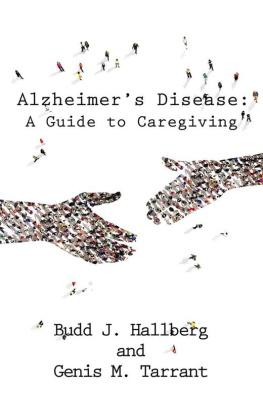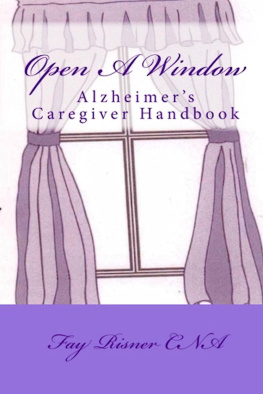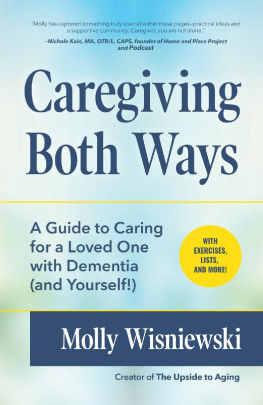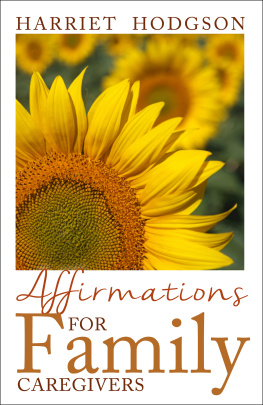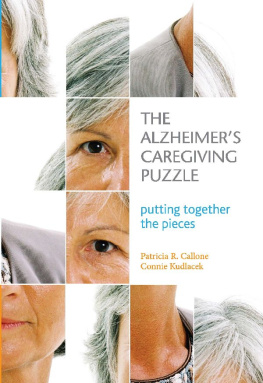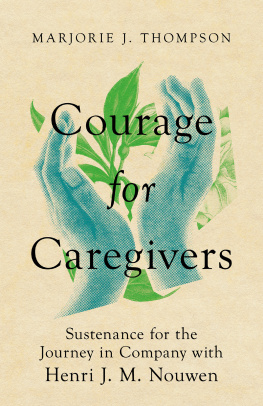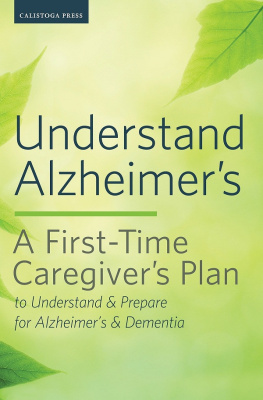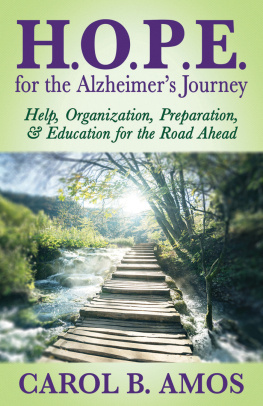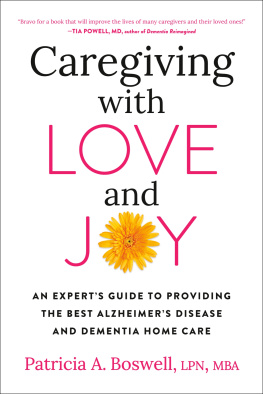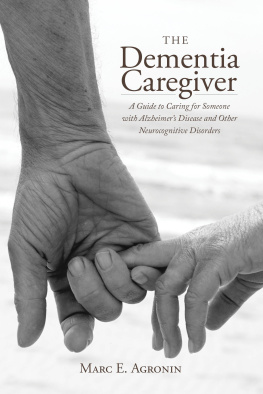Alzheimer's Disease:
A Guide to Caregiving
Budd J. Hallberg and Genis M. Tarrant

AuthorHouse
1663 Liberty Drive
Bloomington, IN 47403
www.authorhouse.com
Phone: 1 (800) 839-8640
2016 Budd J. Hallberg and Genis M. Tarrant. All rights reserved.
No part of this book may be reproduced, stored in a retrieval system, or transmitted by any means without the written permission of the author.
Published by AuthorHouse 05/05/2016
ISBN: 978-1-5246-0309-0 (sc)
ISBN: 978-1-5246-0310-6 (e)
Library of Congress Control Number: 2016905852
Any people depicted in stock imagery provided by Thinkstock are models,
and such images are being used for illustrative purposes only.
Certain stock imagery Thinkstock.
Because of the dynamic nature of the Internet, any web addresses or links contained in this book may have changed since publication and may no longer be valid. The views expressed in this work are solely those of the author and do not necessarily reflect the views of the publisher, and the publisher hereby disclaims any responsibility for them.
CONTENTS
DISCLAIMER
T he materials in this book are intended to help in your understanding of how doctors diagnose and treat Alzheimer's disease and how those with the illness might be able to improve their health and prolong their quality of life by being active and informed patients.
That said, the intended audience for this book is NOT Alzheimer's disease patients. The information in this book is aimed primarily for the Caregivers of those afflicted with the disease.
Neither AuthorHouse nor the authors are responsible for your use of this educational material or its consequences. If an Alzheimer's disease patient or Caregiver has questions about any of the suggestions or recommendations made in this book, they should consult with their: 1) personal physician, 2) attorney and 3) accountant as deemed appropriate.
This volume is dedicated to the Caregivers of those who struggle with Alzheimer's disease. The net proceeds from the sale of this book will be donated to certain research laboratories that are dedicated to developing effective treatments and a cure.
T his book was made possible because a number of highly skilled and thoughtful people provided us with valuable suggestions and criticisms which added much to the text. Sincere thanks to:
Mary Furlong, M.A.
University of Iowa
V. Bruce Hirshauer, Ph.D.
Johns Hopkins University
Nicole Hummel, B.S.
Juniata College
Joshua M. Irvin, Student
Harrisburg Area Community College
Thomas J. Joyce, Ph.D.
Georgetown University
Gary Laabs, M.B.A., A.A.
Babson College
Harrisburg Area Community College School of Nursing
Cynthia A. Leggett, M.B.A.
Alvernia University
Chris Morgenstern, D.C.
Palmer College of Chiropractic
Philip Neuscheler, M.B.A.
Columbia University
Ross Tokosch, B.A.
Duquesne University
Haney Wahba, M.D.
Cairo University Medical School
Post Doctorial training : University of Pittsburgh Medical Center
Scott Wakefield, A.B.
Yale University
Y ou have likely purchased this book for one of four reasons. First, you have been diagnosed with Alzheimer's Disease: (AD) or a Related Disorder (RD) and are wondering what do I do now? Second, you have discovered that soon you will be a Caregiver for a person who is struggling with the disease and are asking yourself - what am I to expect? Third, for some time now, you have been a Caregiver to a person suffering from AD and you are approaching 'Burnout.' Your personal well-being is at stake and you are in serious need of help. Fourth, you are a caregiver to someone who has a like debilitating disease such as cancer, heart trouble, ALS, etc., and are curious to read about what is being said in regard to the topic of caregiving in general. Whatever your reason may be for acquiring the book, we hope it will improve your ability to be a Caregiver.
This book provides guidance to non-professional Caregivers who are responsible for the care, safety and well-being for patients struggling with AD .
P art I defines what Alzheimer's disease is, who discovered it, when it was first detected and how that discovery came about. It outlines the AD diagnostic process and concludes with a number of actions a person should take once they have been diagnosed with AD.
Part II examines the duties and responsibilities of caregiving that are associated with AD. It analyzes the duties and responsibilities of personal versus institutional caregiving and describes each of their particular roles and how they evolve as the disease progresses.
Part III discusses Caregiver orientation. All too often, Caregivers become so consumed with the obligations of caregiving, that they neglect their own health. This section outlines major lifestyle changes that must take place.
Part IV explores the past one hundred years of treatments for ADRD, clinical trials, research and Caregiver investigations. Given the outcomes and progress made to date, "novel" methods for the treatment and cure of AD are recommended.
PART I
ALZHEIMER'S DISEASE
D r. Elizabeth Kubler-Ross once had a patient who said to her "I want to live through my dying."
Anyone who shares that sentiment will find The Last Adventure of Life (by: Maria Hoaglund) a way to expand their consciousness and to prepare for that moment.
-Rabbi Zalman Schacter-Shalomi
CHAPTER ONE
WHA T IS ALZHEIMER'S DISEASE?
Alzheimer's disease is a form of progressive mental deterioration due to generalized degeneration of the brain, occurring in middle or old age.
-Judy Pearsall
Alois Alzheimer.
I n 1906 a German psychiatrist, Alois Alzheimer, performed an autopsy on a former patient who was called Auguste. During the procedure, Alzheimer observed certain pathological conditions which resulted in a diagnosis of senile dementia which "was the first description of what became known as Alzheimer's disease."
Who gets AD and when do they get it?
Both women and men get AD. The disease is more often found in women than men and seems to have a disproportionate impact among African-Americans than other ethnic groups. AD typically appears around the age 65, but age of onset seems to be dropping dramatically -- into the low 50s. While researchers so far, haven't found any particular gene that causes AD, there is a genetically inherited, but rare type of the disease that can strike at an earlier age -- low 30s.
Why some people get AD: others are spared.
People who live healthy lifestyles by exercising regularly, maintaining a non-fat, nutritious diet, exercising their mind by reading, playing mental games and doing cross-word puzzles, all have a diminished loss of memory and seem less vulnerable to AD. Active social lives may help reduce the incidence of AD.
Some disorders associated with the disease include: 1) diabetes, 2) inflammation, 3) stress, 4) high blood pressure and 5) head trauma. Environment is a contributing factor as well in influencing a person becoming susceptible to AD. However, no one knows for sure why some people get AD and others do not.
What is it like to have Alzheimer's disease?
You can experience the dark world of a person afflicted with AD by going to:
The disease.
There is no known effective treatment for AD. The disease is fatal. To survive the best they can, AD patients should seek out the best medical facilities available. In doing so, they will be able to stay ahead of the curve and be on the cutting edge of technological advancements.
Ten Best Hospitals for Adult Neurology & Neurosurgery.
Next page
